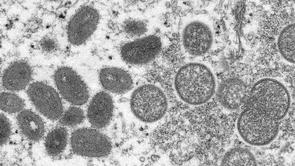Authorities on alert to prevent risk of imported infections entering country
 This 2003 electron microscope image made available by the Centers for Disease Control and Prevention shows mature, oval-shaped monkeypox virions, left, and spherical immature virions, right, obtained from a sample of human skin associated with the 2003 prairie dog outbreak. (CYNTHIA S GOLDSMITH, RUSSELL REGNER /CDC VIA AP)
This 2003 electron microscope image made available by the Centers for Disease Control and Prevention shows mature, oval-shaped monkeypox virions, left, and spherical immature virions, right, obtained from a sample of human skin associated with the 2003 prairie dog outbreak. (CYNTHIA S GOLDSMITH, RUSSELL REGNER /CDC VIA AP)
China has reported no human or animal cases of monkeypox, whose recent emergence in Europe and North America has triggered global concerns, said health experts.
They added that the risk of imported infections in China has risen and precautionary measures ranging from monitoring for telltale symptoms and developing targeted testing kits should be stepped up.
Recent case increases in Europe and North America could be a sign that the virus has shifted — even to a very limited extent — and thus gained stronger ability to spread among humans.
Wang Xinyu, a doctor at the Huashan Hospital of Fudan University’s infectious disease department
Monkeypox is a virus that originates in primates, rodents and other wild animals. The first known human infection was identified in a 9-year-old boy in the Democratic Republic of Congo in 1970, and since then most cases had been reported across central and western Africa, according to the World Health Organization.
The virus can cause a disease with symptoms similar to, but less severe than smallpox, which was eradicated in 1980. Most patients only experience fever, body aches and chills and can recover within four weeks without special treatment, but it can be deadly, with an estimated fatality rate of around 3 to 6 percent, the WHO said.
Recent monkeypox cases are particularly concerning because they have been reported in regions that rarely registered the virus before. From May 13 to Saturday, the WHO said it had identified 92 confirmed cases and 28 suspected cases in 12 such countries, including the United Kingdom, Spain, Portugal, Canada and the United States.
Wang Xinyu, a doctor at the Huashan Hospital of Fudan University's infectious disease department, said it is reasonable for global scientists to be alarmed about monkeypox's sudden occurrence in non-endemic countries.
"Scientists are closely watching the virus, especially whether the virus has changed its transmission route," he said in an article published on Saturday.
"Recent case increases in Europe and North America could be a sign that the virus has shifted-even to a very limited extent-and thus gained stronger ability to spread among humans.
"Even though China has never reported confirmed monkeypox cases, contagious diseases are not bound by borders and the risk of seeing imported monkeypox infections always exists and has risen due to recent cases in Europe and America."
China stopped administering smallpox vaccines-which are found to be around 80 percent effective against monkeypox-in the 1980s, so people under 40 in China don't have immunity against monkeypox, according to Wang.
"As we are closely watching monkeypox infections worldwide, we should step up preparedness early on by launching education campaigns about the disease, intensify monitoring of relevant symptoms and developing diagnostic methods and testing kits, so as to detect imported cases in a timely manner and cut off its transmission," he said.
"Meanwhile, it is time to research targeted vaccines and antiviral drugs," he added.
Tan Wenjie, a researcher at the Chinese Center for Disease Control and Prevention's National Institute for Viral Disease Control and Prevention, said that the possibility for monkeypox to develop into an acute and fatal infectious disease like smallpox is "extremely low".
During an interview with Health News, a newspaper run by the National Health Commission, Tan said human-to-human transmission of monkeypox is mainly through contact with body fluids and blood, while smallpox can be spread through respiratory droplets and direct contact.
"Thus, human-to-human transmission of monkeypox is very limited," he said.
"Besides, although it causes similar conditions in humans as smallpox, monkeypox patients exhibit much milder symptoms."
Tan said that the focus at present is preventing imported monkeypox cases coming from overseas.
China's CDC has created several testing technologies targeting monkeypox that can return results within 24 hours and enable genome sequencing of the virus.
"We have formulated an emergency technical plan for monkeypox outbreaks, prepared testing kits and began training local disease control workers on laboratory testing," he said.
China also has an inventory of smallpox vaccines and can provide over one million doses amid a health emergency, he added.
Rodents such as squirrels and rabbits are banned from being brought into China by incoming passengers, so the risk of monkeypox being imported into the country by international travelers is low, according to Tan.
But quarantine health officials should conduct strict health examinations of people, animals, transport vehicles, containers, cargo and packages from areas affected by monkeypox, he said.


